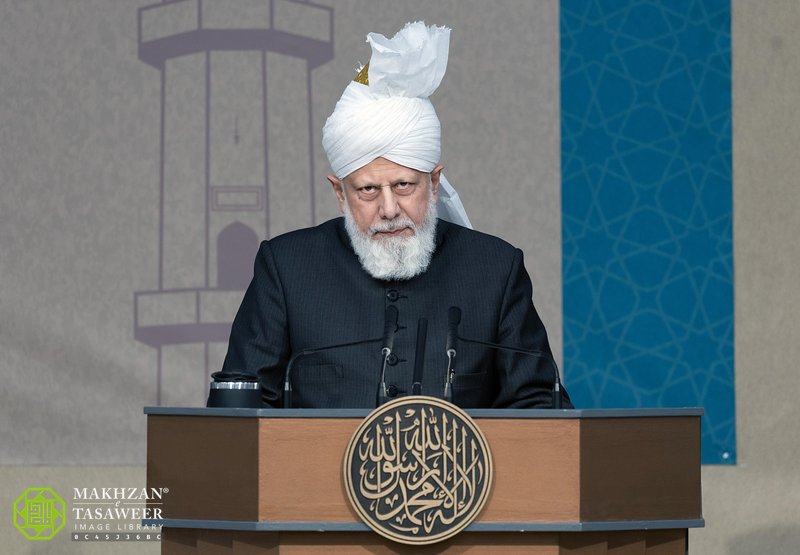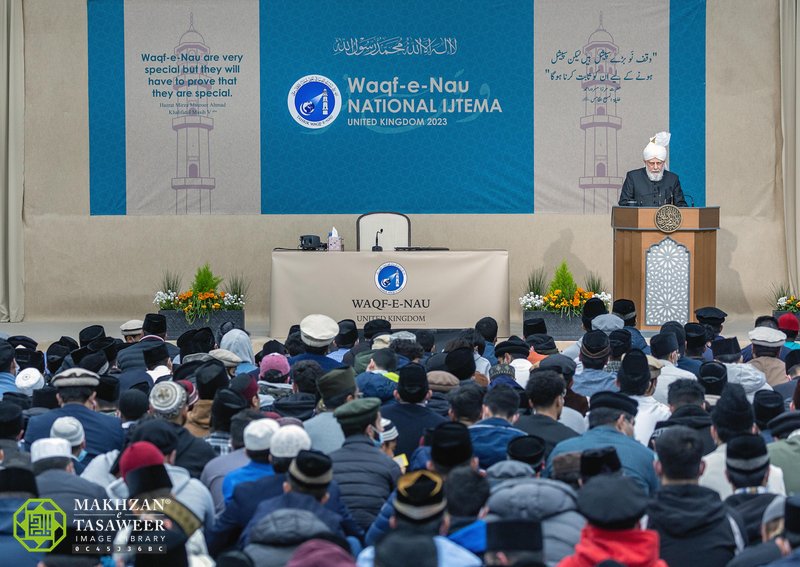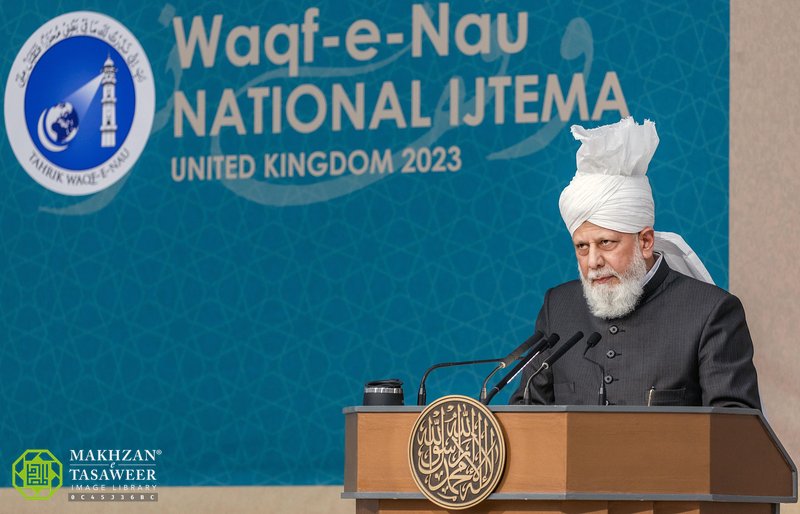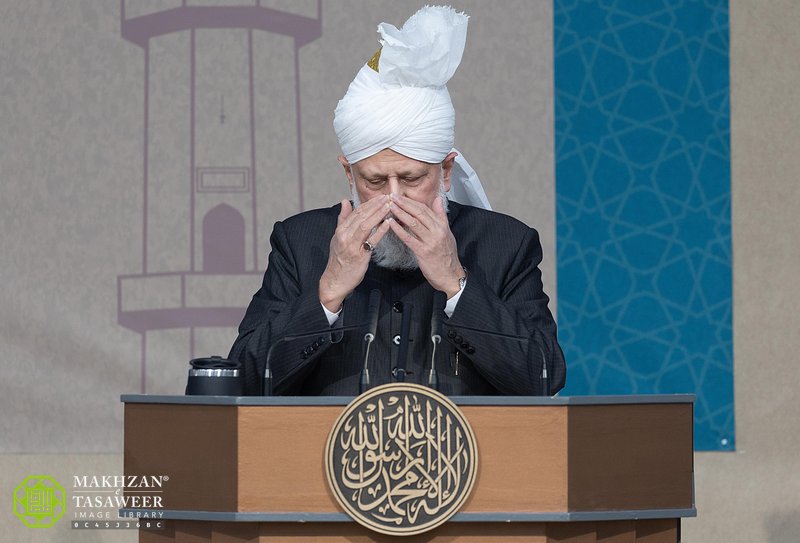
After reciting Tashahhud, Ta`awwuz and Surah al-Fatihah, His Holiness, Hazrat Khalifatul Masih V(aba) said:
‘With the grace of Allah, the National Waqf-e-Nau Ijtema [gathering] of the UK Jama’at is taking place today. The purpose of the Ijtema is for Waqifeen-e-Nau to join together to enhance their moral state, to increase their religious knowledge, to better understand their objectives, and above all, to be inspired towards developing an everlasting bond with Allah the Almighty. The programme has been arranged to facilitate your religious training and spiritual development so that you become closer to Allah the Almighty, as seeking His nearness is the ultimate objective for every Waqif-e-Zindagi [life-devotee], rather for every true Muslim.
As you are all aware, your parents made a decision before you were born to dedicate and devote your lives to the service of the Jama’at. Nonetheless, Waqf-e-Nau are not compelled to remain within this scheme, rather upon reaching an age of maturity, all members of Waqf-e-Nau must determine for themselves if they wish to renew the pledge made by their parents and continue their Waqf [dedication]. Many of you have already reached adulthood or are rapidly approaching it.
Indeed, some of you are married with children and are no longer dependent upon your parents. Consequently, most of you are no longer at an age of ignorance or immaturity and so should be able to fully comprehend and grasp the gravity of the undertaking you have taken as a member of Waqf-e-Nau. In general terms, if you make a promise or pledge to any person, you must try your level best to fulfil it. Otherwise, you would be guilty of deceit and betray the other person’s trust.
As Waqf-e-Nau, the pledge you have made is on a different level entirely as it is not made with any person but directly with Allah the Almighty. You have each promised to spend your lives in His service and be ready for every sacrifice and hardship for His sake. Hence, today I wish to mention the spirit and level of sacrifice required to successfully fulfil and honour the demands of the pledge of Waqf-e-Nau.
First and foremost, it is imperative that you continually strive to elevate the standards of your faith in Allah the Almighty and His religion. Only by attaining the love and nearness of Allah the Almighty can members of Waqf-e-Nau fulfil their pledge of bai’at [allegiance] to the Promised Messiah(as) and the demands of their Waqf.
The covenant you have made demands absolute faith and trust in Allah and requires you to constantly strive to build a living connection with Him. It demands that you be ready for every sacrifice for the sake of Allah and be utterly faithful, sincere and loyal to Him in every aspect of your life. On one occasion, the Promised Messiah(as), whilst mentioning what constitutes true faith and loyalty to God, referred to the fact that Allah the Almighty has praised Hazrat Ibrahim(as) in chapter 53, verse 38 of the Holy Qur’an with the words:
وَاِبۡرٰھِیۡمَ الَّذِیۡ وَفّٰی
“And of Abraham who fulfilled the commandments.”[1]

In relation to this verse, the Promised Messiah(as) said that Allah the Almighty has testified to the supreme obedience and sincere loyalty of Hazrat Ibrahim(as) because he not only made a pledge, but also fulfilled it. As I have said, your pledge is of utmost seriousness and magnitude. In essence, you have affirmed before God that you will be ready for every possible sacrifice and hardship for His sake and will, until your dying breath, seek to serve your faith.
I firmly believe that if every member of the Waqf-e-Nau scheme, with purity of heart, lives up to this pledge, then together you can bring forth a great spiritual revolution in the world and liberate society from the chains of moral decay in which it has become shackled. However, for this you will need the help and love of Allah the Almighty, and to attain that, you must give precedence to Him over everything else.
Explaining the point, the Promised Messiah(as) said:
“To attain the love and nearness of Allah the Almighty, one must manifest absolute truthfulness and sincerity for Him. The love that Hazrat Ibrahim(as) gained was due only to the faithfulness and absolute devotion that he showed to God.”
The Promised Messiah(as) continues, “The verse ‘and of Abraham who fulfilled the commandments’ means that Hazrat Ibrahim(as) showed absolute sincerity and loyalty to Allah. To manifest loyalty, faithfulness and sincerity with Allah the Almighty requires a form of death.”
The Promised Messiah(as) further said, “Until a person is completely ready to completely forsake all the pleasures and attractions of the world and until a person is ready to endure every form of humiliation, hardship and struggle for the sake of God, it is impossible to attain the virtue of truthfulness and sincerity. Therefore, to be truly faithful and sincere to Allah requires a person to be ready to give up all of his desires and worldly pursuits for His sake. It requires a person to willingly withstand humiliation and rejection, to be ready for all possible sacrifices and to absorb every type of torment and grief for the sake of His faith.”[2]
As Waqf-e-Nau, the onus is on you, even more than other Ahmadis, to be faithful and obedient to Allah the Almighty in every respect. Yet, that path to Allah the Almighty is not straight or simple. Indeed, the Promised Messiah(as) has stated that at every turn and corner, there are worldly attractions that can corrupt a person’s faith. In fact, the Promised Messiah(as) has equated anything that takes a person away from God to be a false idol.
The Promised Messiah(as) has stated, “Idolatry is not merely that a person worships a tree or a stone, rather every such thing that proves an obstacle in attaining the love of Allah and takes precedence over Him is an idol. Man harbours so many idols within himself that he does not even realise that he is guilty of worshipping them.” He continues, “Thus, until a person does not sincerely become God’s and until he is not ready to endure every trial and tribulation in His way, it is extremely difficult for him to develop true fidelity and sincerity with God.”[3]

The Promised Messiah(as) goes on to explain why Allah the Almighty has praised Hazrat Ibrahim(as) and conferred such honour upon him; the Promised Messiah(as) states, “Did Ibrahim(as) attain his title for nothing? No. Rather, the words, ‘and of Abraham who fulfilled the commandments’ was bestowed upon him only after he was ready to sacrifice his own son.“
Hazrat Ibrahim(as) gained the love of God because of his willingness to give up everything for His sake to the point that he even stood ready to sacrifice his beloved son.
The Promised Messiah(as) states, “Allah the Almighty desires the practical manifestation of one’s faith. Only through action and deeds is He pleased and such actions demand anguish and struggle.”[4]
Consequently, trials and tribulations are a necessary part of life for a believer. It is quite easy to proclaim that you are loyal to Allah the Almighty and willing to tolerate everything for His sake, but true faith is actually demonstrated when a person is tested and where real sacrifice is required.
Moreover, for those people who exhibit patience and trust in Allah even during times of great struggle, the Promised Messiah(as) has given glad tidings. The Promised Messiah(as) states, “When a person is ready to tolerate pain and grief for the sake of God, then God Almighty saves him from such sorrows. When Hazrat Ibrahim(as), in fulfilment of the command of Allah the Almighty was ready for the sacrifice of his son and had fully prepared for it, then Allah the Almighty saved him. He was hurled into the fire, but the fire could not hurt him.”[5]
The Promised Messiah(as) states that when Hazrat Ibrahim(as) demonstrated his willingness to sacrifice his son for the sake of Allah the Almighty, then Allah stopped him, and He testified to his faithfulness and sincerity. Thus, every Waqf-e-Zindagi, including all Waqifeen-e-Nau, must be ready to endure whatever hardship and adversity comes their way for the sake of Allah the Almighty. If every Waqf-e-Nau and life devotee achieves this, they can consider that they have successfully fulfilled their pledge of Waqf and are destined to be the beneficiaries of the everlasting blessings of Allah that He has promised to those who devote their lives purely for His sake.
So, always keep in view the extraordinary way in which Hazrat Ibrahim(as) fulfilled his pledge. Similarly, you should look to the Companions of the Holy Prophet(sa), who displayed incredible levels of faith and devotion. They surrendered all personal desires and were ever ready to give their lives for the sake of their faith.
Similarly, the Companions of the Promised Messiah(as) also showed exemplary standards of sacrifice. Amongst his followers were those who relinquished all material pursuits and worldly opportunities for the sake of their faith. They included exceptionally well-educated people who had gained bachelor’s and master’s degrees, which was extremely rare at that time, and for whom there was huge demand in society. Instead of seeking fame and fortune, they left behind everything and came into the service of the Promised Messiah(as). They devoted their lives to the service of Islam and fulfilled their pledges without a second thought for what they had left behind.
So, it is with this mindset that the Waqifeen-e-Nau and Waqf-e-Zindagis should seek to live their lives. If not, their claim of having devoted their lives will be hollow and not based on truth.
I reiterate that you must all recognise the value and significance of your pledge, and for this, the most crucial element is to develop a personal bond and loving relationship with Allah the Almighty. As I have said many times before, you must elevate the standards of your worship. Every Waqf-e-Zindagi and Waqf-e-Nau must offer the five daily prayers each day with punctuality and should carefully reflect upon the meaning of each prayers.

It is narrated that once, during the time of the Holy Prophet(sa), a Muslim entered the mosque whilst the Holy Prophet(sa) was sitting with some of his Companions. The man had not offered Namaz [prayer] and so offered it on his own. Once he had finished, he approached the Holy Prophet(sa), who instructed him to offer it again. The Companion did as instructed and returned to the Holy Prophet(sa). Once again, the Holy Prophet(sa) told him to repeat the prayer. So, he went and offered it for a third time. After again observing him, the Holy Prophet(sa) instructed him to pray again. Upon this, the Companion said, “O Messenger of Allah, I have offered the prayers as I know how and cannot pray in a better way than this. So, please teach me how to pray.”
In response, the Holy Prophet(sa) explained how to do justice to Salat [prayer]. He explained that during Namaz, a person should praise Allah the Almighty, express his love for Him, and recite Surah Fatihah, Durood Sharif [sending peace and salutations upon the Holy Prophet(sa)], and all the other necessary prayers while pondering over their meanings.
Moreover, the Holy Prophet(sa) explained that a Muslim should prostrate in sajdah [prostration] with complete humility.[6] Hence, you should offer every Namaz with due care as prescribed by the Holy Prophet(sa) rather than quickly going through the motions.
In addition, a Waqf-e-Nau should be regular in offering Nawafil, voluntary prayers, so that their relationship with Allah the Almighty becomes stronger. Only when a personal and living bond with your Creator develops within you will you start to attain the standard of loyalty required of a person who fulfils his pledge or pledges and who has vowed to dedicate his life for the sake of his faith.
Similarly, as Waqf-e-Nau, you must recite the Holy Qur’an daily and read its translation. In addition, you should study the commentaries of the Promised Messiah(as) and the Khulafa so that your understanding of its teachings increases. Otherwise, if you do not understand the Qur’an’s teachings, how will you practise them, and how will you convey its message to others? How will you be able to ask others to accept what you yourself are ignorant of?
Furthermore, it is the obligation of those who have devoted their lives to demonstrate the highest possible moral standards and to seek to adopt every type of virtue. In your daily lives, you should observe the best morals and etiquettes when you are with your family, friends, and fellow students and in all of your dealings. Always hold fast to the trust and never permit yourself to engage in falsehood. Speak to others respectfully and kindly.
Some of you are married, whilst others will, Insha’Allah, [God-willing] get married in the future. In this regard, Waqf-e-Nau should prioritise righteousness and piety when it comes to finding a wife so that your home environment is religious and according to the teachings of Islam. In reality, you will only consider righteousness to be your priority when marrying if you are religious-minded and value your faith above everything else. Once married, you must treat your wives with love and kindness and fulfil their needs as best you can. You must also set the best possible example for your children. Only if you manifest excellent morals in front of them and guide them towards righteousness will you fulfil your duties to them and towards safeguarding the next generation of the Jama’at.
Another important virtue that you must adopt is modesty. Do not be under the misconception that modesty is something only for women and girls to practice; rather, it is essential for boys and men as well. In this society, indecency and vulgarity is visible almost everywhere. So, when you are out in public, you should lower your gaze rather than look curiously in every direction and towards those indecent things that are contrary to your faith.
Similarly, avoid all immoral and obscene content on social media, television or elsewhere. Exposure to such content is extremely harmful. It can easily corrupt one’s mind and adversely affect your behaviour. Many studies and media reports have proven that exposure to pornography or similar vulgar material is hugely damaging, both at an individual level and for the wider society.
For example, studies have shown that viewing such content leads to disturbing attitudes amongst boys and men towards women and girls and often to violence. Unquestionably, every Ahmadi must exhibit modesty, but there are even higher expectations and demands upon those who have dedicated their lives for the sake of Allah.

It is also extremely important that the Waqifeen-e-Nau pay particular regard to fulfilling their duties as members of Majlis Khuddamul Ahmadiyya [Ahmadiyya Muslim Youth Association] or Atfalul Ahmadiyya [Ahmadiyya Muslim Children’s Association]. You should take a full part in their Ijtemas and other events and be ready for whatever duties are required of you. Whilst the Waqf-e-Nau Ijtema is a one-day event, the National Khuddam and Atfal Ijtemas usually take place over three days, and so you should attend as much as possible and take a full part in the various activities and programmes.
When you attend such events, it should be your firm intention to increase your religious knowledge and improve the practice of your faith. You should set such a high example that other Khuddam and Atfal clearly discern the difference between Waqf-e-Nau and others. In this way, you will become positive role models for them. If you achieve such standards, you will surely become the beneficiaries of countless blessings and rewards from Allah the Almighty.
Similarly, in the field of tabligh [propagation], the Waqf-e-Nau should be at the forefront of spreading the message of Ahmadiyyat. In this era, the opponents of Islam are attacking the teachings of Islam on a daily basis. Furthermore, ignorant and entirely false interpretations of Islamic teachings by extremists enable them to unfairly malign and ridicule our religion.
Hence, to enlighten the world of the matchless teachings of the Holy Qur’an and to inform mankind of the unparalleled status of the Holy Prophet(sa) is the paramount duty of every Ahmadi and especially Waqf-e-Nau. To be successful in tabligh, it is vital that you gain religious knowledge, and you must also sincerely pray that Allah blesses your efforts and those of other Ahmadis engaged in spreading the message of Islam.
To win people’s hearts, you must ensure your personal example and conduct is beyond reproach. Show sympathy and love for others and care for those in need. If you are kind and considerate, you will find that people are naturally inclined towards you, and it is more likely they will be drawn towards the teachings of Islam. By observing your pious nature, any false misconception about Islam will naturally be eliminated from the hearts and minds of non-Muslims.
It is also imperative that the Waqf-e-Nau strive to develop an unbreakable spiritual bond with the Khalifa of the time and display the highest standards of loyalty and obedience to the institution of Khilafat. If you are sincere with Khilafat, it will not only benefit you personally and be a means of gaining the rewards of Allah, it will ensure that the unity within our Jama’at will grow ever stronger.
Another quality that you must seek to cultivate is humility. You should abandon all forms of arrogance and egotism. Do not think yourselves better than others. Indeed, you should have a hatred for arrogance and self-importance. Allah the Almighty loves those who are humble and abhors those who are proud. Despite his great status, the Promised Messiah(as) was always the epitome of humility. As a result, he received a revelation from Allah the Almighty that “Your humble ways were liked by Him.”[7]
Having taken the bai’at of the Imam of the Age, the Promised Messiah(as), and pledged to act upon and propagate his teachings, we must endeavour to be like him. We must strive every day to instil within ourselves those qualities and virtues fundamental to righteousness. Only then will we be amongst those fortunate souls who have fulfilled the objectives of their Waqf and the demands of their pledge.
Before concluding, I also wish to remind you that Promised Messiah(as) has stated that his followers should seek to learn about the world and gain its insight. Accordingly, apart from religious studies, Waqifeen-e-Nau must also strive to excel in their secular education. Always seek to increase your knowledge, and do not waste time on trivial things. Consider how you can benefit humanity and advance human understanding.
The Waqifeen who enrol in Jamia Ahmadiyya should also, alongside their religious studies, try to increase their secular knowledge. It is vital for missionaries to have an understanding of what is happening in the world so they can relate to other people.
Furthermore, those Waqifeen-e-Nau studying or working externally, particularly in research, should endeavour to climb to the pinnacle of their respective fields of learning. If you excel in acquiring worldly and religious knowledge, you will have the intellectual armoury to propagate the message and teachings of Allah the Almighty and defend Islam from those who seek to defame it.
Furthermore, you will, Insha’Allah, gain the ability to bring people towards the worship of the One God and under the banner of he who was the most honoured of all mankind, the Holy Prophet Muhammad(sa).

At the end, I sincerely pray that Allah the Almighty enables all of you to fulfil the pledge you have made to dedicate your life for the sake of Islam with unconditional loyalty and sincerity. May He grant you the capability to elevate your moral and spiritual standards and enable you to continually increase your service to the Jama’at. May you be counted amongst the most faithful soldiers of the spiritual army of the Promised Messiah(as), whose mission is not to conquer lands or territories but rather to win the hearts of mankind and to bring the people of all nations, races, and beliefs towards Allah the Almighty. May all of you, as Waqifeen-e-Nau, come to play an outstanding role in conveying the message of Islam and Ahmadiyyat to every corner of the world. May Allah enable you to do so, Ameen.’
ENDNOTES
[1] The Holy Qur’an 53:38.
[2] Al Hakam Vol. 7, No. 10, 17 March 1903, p. 1 referenced in Tafsir Hazrat Masih-e-Mau’ud Vol. 7 p. 306.
[3] Ibid.
[4] Ibid.
[5] Ibid pp. 306-307.
[6] Sahih al-Bukhari, Kitab al-Adhan Bab Amr al-Nabi (sa) allazi la Yutimmu Ruku’ahu bi al-I’adah.
[7] Tadhkirah p. 595 Fourth Edition.